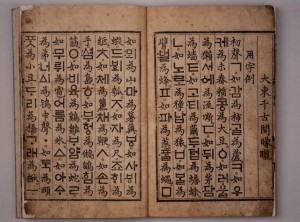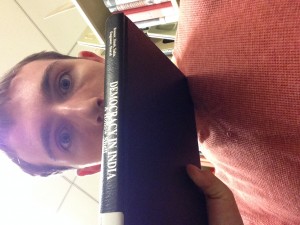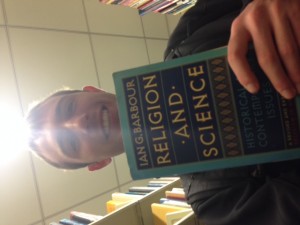The Hangul is a document created by scholars commissioned by King Sejong of Korea. It was developed and distributed to demonstrate and popularize the newly created Korean alphabet and translation between Chinese characters and the newly created alphabet. The original copy can be found in the “National Hangeul Museum” in Seoul, Korea.
All posts by Matthew Carpenter
Matt Carpenter Shelfie: “Democracy in India”
Arthur Bonner’s work “Democracy in India: A Hollow Shell” focuses on society in India and how and in what ways the people have changed under various political and social climates. This book is historic in the fact that it covers important topics with factual bases to construct a telling of how modern India came to be. The source is academic in nature in that it analyzes and synthesizes various works, essays, writings, and other media. The author weaves various facts and writings from Indian people and outsiders about the Indian people into a single narrative. Also to note, the book is 255 pages and is spaced into 11 chapters divided generally by time period/social movement.
More specifically, the book begins with an in-depth summary of Indian caste society formed in antiquity and its various forms over the centuries. Then it discusses how these concepts interacted with British imperialism and political struggle. Furthermore it discusses how imperialism changed the national mood and self-image and how this self-image is potentially greatly distorted from the reality of the nation. Essentially, Bonner uses historical sources to support the claim that the marks of the caste system and imperialism had a strong effect on India and such events have maintained control over Indian culture since.
Not only is the book interesting and informative about India in its own right, but his book is very relevant to our class in both region and time period. A central portion of the book considers British imperialism on the nation both politically and socially. One of the main foci of our discussion on imperialism was on India, and thus the book is quite relevant.
To now talk a little about the research process, I used the library catalog under the search “India”. From there I found a variety of books in a single section, went to that section, and decided to choose this book. The title caught me because I knew democracy “arrived” in India promptly after WWII and the struggle for democracy occurred during the exact period we are currently discussing. Also, the adjacent books, though all about India, did not as closely correspond to our current point in history or the topic. Other books talked about the caste system in India as well as Indian-Pakistani relations and post-national political issues involving India.
Anyway, in conclusion Bonner’s work “Democracy in India” is both informative historical work and pertinent to the class.
Bonner, Arthur. Democracy in India: A Hollow Shell. Washington, D.C.: American UP, 1994. Print.
Matt Carpenter Shelfie: “Religion and Science”
In my search to find a book, I looked up the terms “history”, “religion”, and “technology”. I then decided to look at some books from the religiously-focused section of books and found “Religion and Science” by I an G. Barbour. I think what caught my eye, beyond the general appearance of the book, was the title; it seemed like a book that was both pertinent to the class and interesting in its own right. The book appears to be about chronicling the interplay between scientific advances and religious beliefs from the enlightenment onward. Looking through the table of contents it appears that ideas from thinkers such as Newton, Galileo, Pascal, and Einstein are contrasted with conjugate religious theories and the how each reacted to the other. Adjacent to the book there are books about the Devil as well as about Idolatry, which are less interesting in my opinion, but to each his/her own
Barbour, Ian G. Religion and Science: Historical and Contemporary Issues. San Francisco: Harper, 1997. Print.


